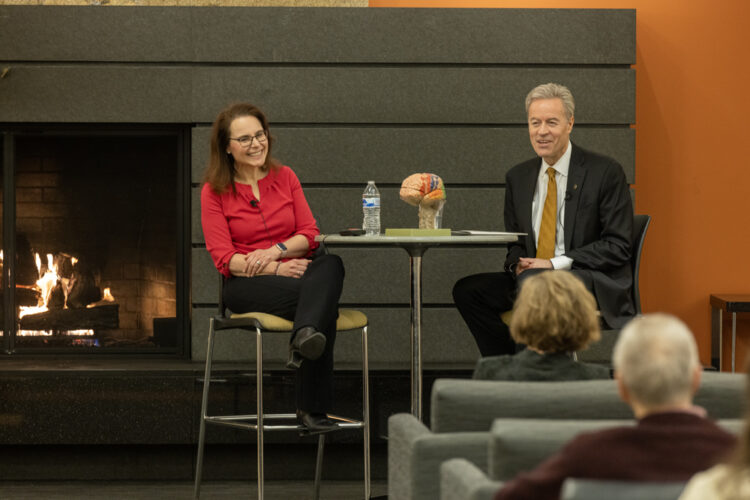UWM research is making a difference, and UWM Chancellor Mark Mone is sharing what’s happening in a series of Chancellor Chats.
Karyn Frick, distinguished professor of psychology, joined Mone for the inaugural chat on Wednesday, Feb. 14. The two discussed Frick’s groundbreaking research on the impact of estrogens in regulating memory formation and brain function. Future chats will include other researchers, scientists, alumni and partners.
Mone and Frick talked about her work and offered the roomful of listeners, who gathered in the UWM Student Union’s Alumni Fireside Lounge, the chance to ask questions about aging, brain function and dementia.
“Our memories make us who we are,” Frick said. “Everyone has different memories. That’s what makes us all unique.”
Frick’s Neuroendocrinology of Memory Lab focuses on understanding the brain mechanisms that underlie memory formation so that she can use this information to develop treatments that reduce age-related memory loss and dementia in Alzheimer’s disease. She is primarily interested in how estrogens enhance memory formation and how estrogen loss at menopause leads to symptoms like memory loss and hot flashes.
This work led Frick to co-found Estrigenix Therapeutics Inc., a pharmaceutical company focused on developing treatments for menopausal women that provide the benefits of estrogens without the harmful side effects of traditional hormone therapies. Frick serves as chief scientific officer for Estrigenix, which was founded in 2018 with support from the UWM Lubar Entrepreneurship Center and the UWM Research Foundation.
The lab’s research has shown that estrogens can promote memory formation and reduce memory dysfunction in animal models of age-related memory loss and disease processes like dementia and Alzheimer’s.
“Memory loss is not inevitable,” she added. Senior moments are normal, and many people stay mentally sharp well into old age, she said. It becomes an issue when it begins to interfere with daily life.
Although the lab’s research focuses on women, both men and women produce estrogens as part of normal hormonal functions. The goal of the research is to understand the neurobiological mechanisms through which estrogens regulate memory so that this information can be used to develop estrogen-like compounds to alleviate memory loss.
One challenge, Frick explained, is that traditional hormone therapies for women came under scrutiny in the early 2000s when clinical studies showed increased chances of breast and uterine cancers in some elderly women.
Future treatments will need to overcome these issues. Frick and Estrigenix hope to do so by targeting a certain protein that binds estrogens and promotes memory without causing cancerous cell proliferation.
The effort is complicated, requiring research from the fields of biology, chemistry, physics and other scientific fields, Frick said.
She’s quick to point out that she is not the only one doing the work at UWM. The lab includes research projects involving graduate students, postdoctoral students and undergraduates. She and others in the lab also collaborate with scientists from other universities on a variety of projects.
“Science is always evolving,” Frick said, and these collaborative efforts are making a difference.
All of this research makes Frick hopeful that new therapies will be developed for Alzheimer’s and other progressive memory conditions within the next five to 10 years.
“If we can identify the mechanisms, then we can develop better treatments,” she said.
Participants in the Chancellor’s Chat asked Frick about everything from alleviating menopausal symptoms to the use of herbal remedies and phytoestrogens to federal funding for this type of research.
One major question: “What can people do to prevent memory loss as they age?”
The answer, according to Frick, is a healthy lifestyle. Improved diet and regular exercise can help with brain function as well as cardiovascular disease and other conditions that may affect the health of the blood vessels that feed the brain. Making changes at any time can help, she added. “It’s never too late.”







